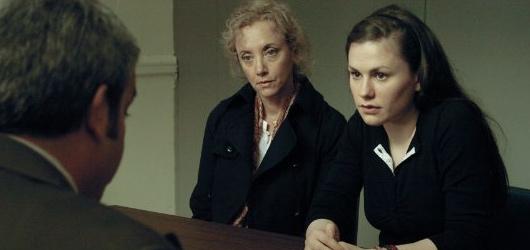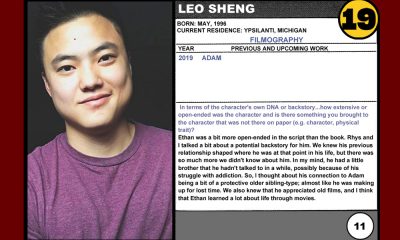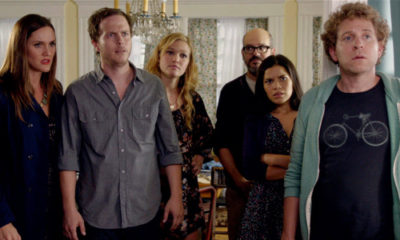Retro IONCINEMA.com
Nicholas’ Top 20 of 2011: Picks 10-1
The title of the film is taken from a poem by Gerard Manley Hopkins called “Spring and Fall,” wherein the poem’s narrator addresses a young girl named Margaret. The narrator instructs the young woman, “Ah as the heart grows older/It will come to sights much colder….It is the blight man was born for,/It is Margaret you mourn for.” And so it is Lisa who begins to learn that she’s not grieving for the dead woman or even fighting for justice. Instead, she’s mourning for her own loss of ideals, her own dissipation of youth and ignorance. A complicated, thoroughly impressive film with some excellent dialogue, it’s also a nostalgic time capsule of both New York and its actors from a few years ago, filmed in 2005. Since then, all our hearts have grown older.
10) The Hedgehog
The debut of director Mona Achache, The Hedgehog, based on a popular French novel, centers on Paloma (Garance Le Guillermic), an 11 year old girl that, fed up with her world, has decided to kill herself on her twelfth birthday. Formidably (and thankfully, not annoyingly) precocious, Paloma is fascinated with art and philosophy, decided to film her world around her as she moves forward with her plan, narrating her opinions to us on what’s wrong with her parents and the world at large. Paloma meets a kindred spirit in the form of the cranky and seemingly unhappy Renee (an absolutely fabulous Josiane Balasko), the building janitor. The arrival of a new tenant creates some ripples as he flirts with the avid reader Renee through Tolstoy’s Anna Karenina and the cinema of Ozu, and soon a very endearing and unpredictable romance ensues. Touching, tragic, and funny, The Hedgehog is an excellent debut, and features a great performance from one of France’s best performers.
9) When We Leave
This directorial debut from Austrian actress Feo Aladag stars the gorgeous Sibel Kekilli (of Fatih Akin’s Head-On) as Umay, a woman of Turkish descent living in Germany, in the midst of attempting to leave her abusive husband. As she flees with her son (in one incredibly tense scene) and seeks solace with her family in Berlin, she finds she is rejected at every turn due to religious and traditional conventions. A deadly look at the clash of Western and non-Western ideals in the Turkish community, Kekilli gives one hell of a performance as a woman struggling to make a better life for herself even as her own family sabotages her. Infuriating, compelling, and altogether one sucker punch of a film.
8) A Separation
Much praise has been heaped on this Iranian film from director Asghar Farhadi, the seemingly simple tale of a married couple faced with the decision to leave Iran. Opening with Nader (Peyman Moaadi, in an excellent performance) and Simin (Leila Hatami) arguing in front of a judge concerning divorce proceedings, it’s this initial separation that causes the remaining conflicts of the film. Simin is eager to leave Iran for a more progressive country, both as an opportunity for herself and their 11 year-old daughter. Nader refuses to leave, citing that he needs to stay and care for his father, ailing from Alzheimer’s. Upset that he refuses to leave and that he would rather agree to divorce then do so, Simin flees to her parent’s house, their daughter choosing to stay with her father. When Nader hires a working class woman to care for his father while he is at work, a situation arises which results in one hell of an awesome drama that plays out like an enticing thriller. Beautifully shot and superbly acted, it transfixes from the first frame.
7) We Need To Talk About Kevin
Lynne Ramsay’s much anticipated follow-up to her quietly beautiful 2002 film, Morvern Callar, plays like The Bad Seed meets The Omen at Columbine. Tilda Swinton gives a knockout performance as a mother who obviously dislikes her child (still a perversely taboo theme, check out a similar mom character played by Isabelle Huppert in 2007’s L’amour Cache) and arguably deserved that Best Actress win at Cannes even more than Ms. Dunst. Played by three different actors at different stages, culminating in the coolly calculating Ezra Miller as a teen, Kevin’s story is told in flashback via his mother and her feelings of guilt surrounding his killing spree, and plays somewhat like a perverse horror film about parenting. Are some kids born evil? Perhaps. But as a film about grief and societal trappings of supposed responsibility, this really is one woman’s dark shower of dead dreams. Swinton dominates every frame, but Ramsay’s artistic flourishes pack some punch, in particular, one instance where the irises of the bow-wielding Miller reflect target signs as he practices archery.
6) Martha Marcy May Marlene
Elizabeth Olsen gives a star making turn as Martha, an escaped cult member, rescued by her estranged sister (Sarah Paulson) who has no idea what’s going on. Haunted by memories and a terrifying paranoia that the dangerous cult leader (John Hawkes, in terribly creepy turn) will soon find her, Martha exhibits increasingly aberrant behavior, alarming her sister and brother-in-law (High Dancy). Filled with plenty of uncomfortable sequences, Sean Durkin’s debut drifts hazily between Olsen’s current surrounding and her recent experiences, creating a nightmarish landscape where it always takes a moment to adjust to the scenery. With each passing scene, an ominous anxiety increases, coming to an incredibly satisfying conclusion.
5) Weekend
While I was not a fan of Andrew Haigh’s 2009 debut, a docudrama low budget film called Greek Pete about an aspiring gay porn star that was more borderline soft-core nonsense than anything, I was amazed at his touching and realistic sophomore effort, Weekend, about two young twentysomething British guys that meet one weekend and find that they have an extremely strong connection to one another. It’s basically a one night stand story that quickly becomes something of a love story, but one that is not altered by romantic fantasy and keeps its story on a realistic level, which makes the situation of its protagonists all the more poignant (one of them is leaving for America at the end of the weekend). Newcomers Tom Cullen and Chris New give exceptional performances. It is indeed one of the best realized films about being gay in the modern day world, about the difficulty of finding a connection in a community still not treated equally, and of the difficulty it is to be your authentic self both in and out of that community.
4) Another Happy Day
A bitter, nasty, angry film about family members getting together for a wedding, this is the directorial debut of Sam Levinson (son of Barry), and showcases Ellen Barkin in one of her most powerful screen performances. Barkin’s oldest son is about to get married, and family members are converging at her parents’ (George Kennedy and Ellen Burstyn). Slowly, bit by bit, the strange and divisive family dynamic is revealed. Barkin’s abusive ex-husband (Thomas Haden Church) wants to reconnect with their daughter (Kate Bosworth), as upon their separation, he took their son and left Barkin and Bosworth. It’s apparent that their daughter is having severe emotional difficulties as a young woman, as are Barkin’s two younger boys from her second marriage, played by Ezra Miller and Daniel Yelsky.
Barkin’s mother seems to care more for her ex-husband and his new wife, played by Demi Moore, and Barkin’s harpy bitch sisters (Siobhan Fallon and Diana Scarwid) also seem to despise her. Incredibly dark and nerve wracking, Another Happy Day is certainly not for all tastes, but it’s honestly one of the best films I’ve seen about how messed up families can really be—and how ridiculous it is to keep traditions like weddings, holidays, and funerals to keep throwing them together. Barkin deserves an Oscar nod, but this material is way to dark and daring to be appreciated by the mainstream.
3) Melancholia
Lars Von Trier’s quieter and elegiac treatment of depression (at least in comparison to 2009’s Antichrist) manages to also be an astounding piece of cinema. Divided into two parts, each named for sisters Justine and Claire (played by Kirsten Dunst and Charlotte Gainsbourg), the film opens with the wedding reception of Justine to Michael (Alexander Skarsgard). We’re treated to a rather boorish reception affair set on the posh estate owned by Claire’s husband (Kiefer Sutherland), where it’s obvious that Dunst is having a difficult time coping with the proceedings, unsure if she’s truly happy about what’s going on. As the night goes on, she breaks down even more, after a succession of depressing relatives and friends make their rounds, including her viciously bitter mother (an awesome bit part for Charlotte Rampling), her drunken father (John Hurt), her maniacal boss (Stellan Skarsgard), his clingy and needy new protégé (Brady Corbet), and a wedding planner that hates her because she’s ruining the reception (Udo Kier).
As it devolves even further, Melancholia opens its second half, where the eponymous planet threatens to hit collide with the Earth and destroy it. Dunst, now nearly comatose with depression, is cared for by Claire. As the inevitability of a collision becomes more and more obvious to the sisters, one of them is clearly better able to cope, and is actually comforted by the eventual demise of life. It’s a deliciously beautiful film.
2) Drive
Words cannot describe the cinematic perfection of a movie like Nicolas Winding Refn’s Drive. Ryan Gosling stars as a stoic stunt driver in Los Angeles, falls in love with a taken woman next door (Carey Mulligan) and because of her becomes involved in a heist gone wrong scenario that results in a price on his head. While many have descried that Refn’s film is nothing but an art house genre exercise, and Gosling’s minimal performance dismissed as another “no expression” entry in the limited pantheon of masculine action films, it can only be argued that these critiques are careless and limited.
Speckled with bits of glorious car chases, gory violence, and that crazy little thing called love, Drive evokes more emotion than any of its uber masculine genre predecessors. Whether it was the demise of the Christina Hendricks character, Albert Brooks (in an awesome performance) and his fork scene, or that inarguably paramount elevator sequence that will be forever burned into my psyche, all tuned to a deliriously melancholy, vintage evoking soundtrack, I fell head over heels in love with Drive. And to hear wisps of the song “A Real Hero” drifting out of cars all over Los Angeles after the film’s release made me realize that it’s a love that’s shared.
1) Margaret
Due to several lawsuits, the sophomore effort of Kenneth Lonergan was delayed for several years and finally plopped into theaters this past fall. After playing for one week in Los Angeles, it was unceremoniously yanked from theaters, with reports that only around seven or eight hundred people attended, which makes this one of the most profoundly neglected films of recent history. Margaret tells the tale of a high school student, Lisa Cohen (Anna Paquin, never more nuanced and stirring than she is here) who witnesses a bus accident. As Lisa holds a dying woman (Allison Janney) in her arms, a moment of such horrific realness and empathetic beauty is created that rivals any scene from any genre this year. From this scene forward, Lonergan’s film explores Lisa’s decision to first side with the bus driver in stating the dead woman was at fault….but then changes her mind. The deliberation over who was at fault and the intentions of Lisa and the bus driver (Mark Ruffalo) begin to affect various people, including her actress mother (J. Smith Cameron—whose scenes with Paquin will have you transfixed) and the best friend of the dead woman, Emily (Jeannie Berlin, a caustic and incredibly arresting presence). But as Lisa’s behavior begins to be more and more erratic and her intentions are called into question, the film becomes about her own ideals and how they’re at odds with reality.
The title of the film is taken from a poem by Gerard Manley Hopkins called “Spring and Fall,” wherein the poem’s narrator addresses a young girl named Margaret. The narrator instructs the young woman, “Ah as the heart grows older/It will come to sights much colder….It is the blight man was born for,/It is Margaret you mourn for.” And so it is Lisa who begins to learn that she’s not grieving for the dead woman or even fighting for justice. Instead, she’s mourning for her own loss of ideals, her own dissipation of youth and ignorance. A complicated, thoroughly impressive film with some excellent dialogue, it’s also a nostalgic time capsule of both New York and its actors from a few years ago, filmed in 2005. Since then, all our hearts have grown older.
 |



























